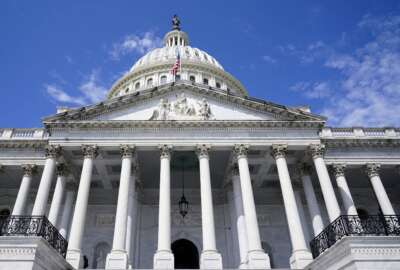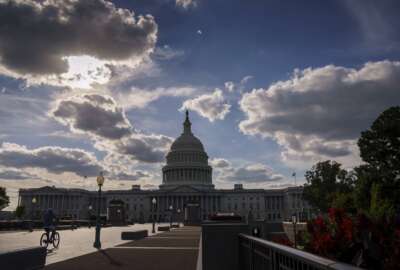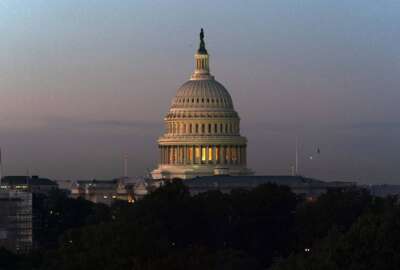Hubbard Radio Washington DC, LLC. All rights reserved. This website is not intended for users located within the European Economic Area.
Why there’s not a huge cause for optimism for the rest of the federal budget year
The latest continuing resolution Congress passed last week avoided a government shutdown. But even if lawmakers achieve that feat again next year, on the two di...
The latest continuing resolution Congress passed last week avoided a government shutdown. But even if lawmakers achieve that feat again next year, on the two different dates when the CR expires, there are a lot of other ways the rest of fiscal 2024 could be messy for federal agencies and their vendors. To look into it further, Federal News Network Deputy Director Jared Serbu talked with Larry Allen, President of Allen Federal Business Partners on the Federal Drive with Tom Temin.
Interview Transcript:
Larry Allen Jared, my primary concern still remains that we very much have the possibility of at least a partial government shutdown in passing the most recent continuing resolution, as you and for Congress set up kind of a two-tiered system. The non-controversial agencies, we’ll just put call them that for sake of identification. Their funding is good through January 19th, when I would expect that most, if not all of those agencies will get their funding for FY24 right around that time. It’s the second set of agencies like DoD and the Department of Homeland Security that we have to watch out for. Those are the ones that, although they’re funded now through the beginning of February, there’s sharp disagreement just with even within the House of Representatives. Not to mention between the House and Senate on funding levels where the cuts are going to come, how much aid we’re going to provide overseas, things of that nature. And I just think that we can’t discount the fact that there are going to be some members of Congress who won’t be happy this appropriations cycle until they get at least a partial shutdown. So, we’ve got to watch that. The other issue that I think people need to be aware of is a 1% sequester, an automatic cut that’s going to kick in on January 1st. Congress put that provision in the debt ceiling bill earlier this year, Jared, and they said, look, if we Congress don’t do our job and pass all the appropriations bills by the end of the 2023 calendar year, we’re going to impose an automatic 1% across the board cut in discretionary spending. Now, surprise, they didn’t get that done by the end of 2023 calendar year. So, we’re going to have that. Now, Congress could always restore it, but I don’t think that they’re really in a mood to do that.
Jared Serbu Yeah, that automatic cuts just struck me as a weird decision because if there’s anything we learned from the last time we did sequestration in 2013, it’s that automatic cuts do not work as an incentive to get Congress to do its job. And we obviously saw the consequences of that back then. And I think there’s a lot of uncertainty around what that 1% would look like because it’s it would be subject to some kind of order from the president that would dictate the terms of exactly how it would work. And I guess maybe you have more clarity on this than I do. It would happen midway through the fiscal year when agencies have already spent been spending at 2023 levels. So that 1% cut would be, you know, reduce the budget authority for the entire year in the middle of the year. So, it would feel even steeper than 1%. Does that seem right to you?
Larry Allen It would feel steeper, Jared and there are a couple of different ways to measure it. The one that you talked about is the most straightforward way. You know, you’re here on a continuing resolution. You can’t start anything new. And then surprise, here you are somewhere through the year, and you can’t even spend the money that you’ve been spending to keep your doors open and keep all the current missions supported. So, you know, you’re going to have a problem with that. But another way that a lot of people are looking at it is look at the Department of Defense as an example. DoD is projected to get a spending increase for FY 24. So right now, they’re stuck at FY 23 levels, which, you know, frankly, the Department of Defense has learned to manage until the end of the calendar year. Now we’re going to have to do it for longer than that. And so not only are they not going to get an increase, but they’re also going to get a cut from their baseline. So, if you look at the difference that way, that’s a pretty stark cut as well and a pretty stark cut in an area, national security where I don’t really think a lot of people would like to see it cut right now.
Jared Serbu And they have the additional management challenge of being, I think, the only agency that has funding on two different steps of the ladder. They have their MILCON budget in that first tranche that you talked about in the rest of the defense budget on a second step of the ladder that comes later.
Larry Allen That’s right. You can build all of the military buildings that you need to do all the military facilities. You might just not be able to put any IT or personnel in it.
Jared Serbu Let’s pivot here to several really significant rule changes the GSA proposed last week. I know you’re watching two of them in particular, one dealing with some more clarity around CICA. Let’s talk about that and how that would work with schedules and why you think it’s a good thing.
Larry Allen Jared, what we’re talking about here is GSA is proposing to Congress a change in the Competition and Contracting Act that would specifically recognize the GSA multiple award schedule program. When CICA was passed back in the 1980s, I think safely to say before any of us were working in government procurement, they originally called out the multiple award schedules program as meeting the demands of the Competition and Contracting Act. If doing so resulted in the lower lowest overall cost alternative to the government. Traditionally, that’s been interpreted as meaning, hey, you know, it’s lower if we don’t have to start a new procurement from scratch, it’s lower If we get to lower our procurement overhead by using preexisting contracts. And that’s always been pretty well understood. More recently, however, there have been some questions about that in GSA and the whole move towards low priced technically acceptable contracting has kind of gotten caught up in this definition. Jared And so what GSA is trying to do is ask Congress that the language would be modified somewhat so that using multiple awards schedule contracts would be in the best interest of the government so as doing so represented the best overall value. And that’s consistent with best value, the best value message that GSA and other agencies are trying to send for many of their acquisitions. Certainly, low price has a place, but so too does best value. That’s just kind of common sense from everybody’s business and personal lives. And so, I think this is a good move. I think that’s something the GSA has wanted to do for a couple of years now. They’ve asked Congress to do it. I hope the Congress will look upon that favorably.
Jared Serbu Do you see it as meaningfully reducing the number of cases where agencies feel like they need to do LPTA competitions?
Larry Allen I’m not so sure from a customer perspective, Jared, except for the fact that if this modification does go through, it’ll be something that GSA and its schedule contractors will be able to say, hey, we meet the brand new revised CICA definition, which is always something that you can play off to increase the visibility of the program and remind people, hey, the schedules are here, they’re competitive, they’re a good way to buy. I think internally inside GSA, it all emanates some confusion about just what that precise meaning is in value versus cost. And I think it might clear up as many internal headaches as it does external ones.
Jared Serbu The other one that you flagged for us in this week’s newsletter is GSA proposal to make permanent the economic price adjustment changes that were made during the pandemic. Talk to us about why that’s a big deal.
Larry Allen So this is a big deal, Jared, because the economic price adjustment clause is the way that schedule contractors can increase their pricing on contract. And up until now, they’ve had four different economic price adjustments, clauses in the same schedules program, a lot of it, depending on whether or not you have professional services or products. And for products, there had been a 10% cap on how much you could raise your price at any one year during the pandemic and during the time of inflation in the last year or two when prices were obviously were going up by more than 10% a year, in many cases, GSA took a deviation from their economic price adjustment clauses to reflect economic reality, and they’re to be applauded for doing that. Now, what they’re trying to do is seeking to make that deviation permanent by saying, hey, GSA schedule contracts are by definition based on commercial market prices and commercial market habits. We ought to be able to have an economic price adjustment mechanism in place that recognizes fluctuations in commercial pricing as impacting the price that buyers will pay on schedule. Whether that’s a decrease, which most contractors do decrease their prices in order to remain competitive when they need to do that or an increase. If you have something say we’ve had in the past, we’ve had a hurricane take out a substantial amount of wood from forest production and that caused the price of wood-based furniture to increase substantially. And so, GSA had to make a special determination that off wood furniture companies could increase their pricing. It’s the same thing here. But rather than doing it on a one-off basis, GSA is trying to bake in flexibility across the program. I think that’s a good move, too.
Jared Serbu And what does it mean for the types of information and the amounts of information that schedule holders will need to provide to GSA to justify those increases when they feel like they need one.
Larry Allen Jared, I think that’s a really great question and I think the thing that contractors need to keep in mind is that they can’t assume, in fact, they shouldn’t assume that their contracting specialist or contracting officer has all the latest economic data. They may not be reading The Wall Street Journal and Federal News Network as much as other people are. So, if you’re a contractor seeking an economic price adjustment on your contract, I recommend that you provide your contract specialist contracting officer with additional data to support the requested increase. Look at things that are happening in the commercial market generally. In your market specifically. Keep in mind that to a certain extent your schedule price is always going to be a little bit behind where you are commercially because you’re going to have to show GSA that you have built and been paid commercially on those increased prices. But aside from the schedule-based pricing data to support your price increase request, I think you need to be prepared to provide a little extra data about what’s going on in the economy generally so that the contracting officer understands that.
Copyright © 2024 Federal News Network. All rights reserved. This website is not intended for users located within the European Economic Area.
Jared Serbu
Jared Serbu is deputy editor of Federal News Network and reports on the Defense Department’s contracting, legislative, workforce and IT issues.
Follow @jserbuWFED





